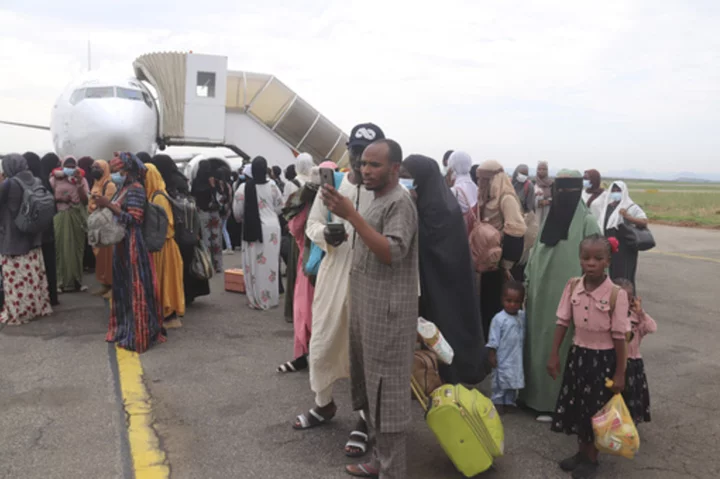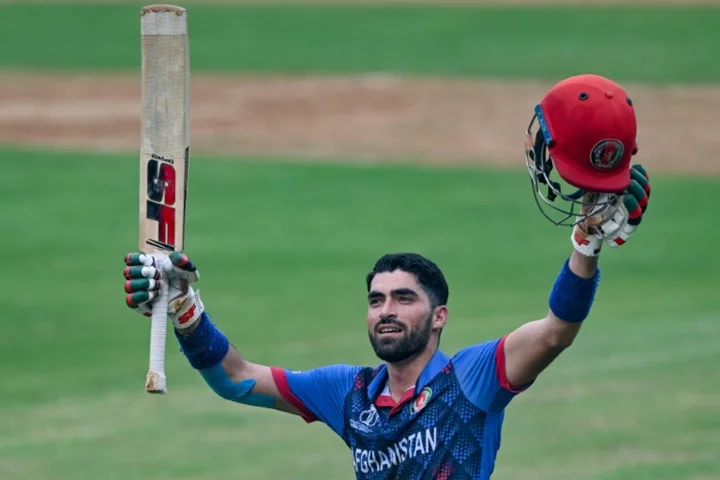CAIRO (AP) — U.S. Secretary of State Antony Blinken on Tuesday warned Sudan's rival generals to abide by the latest cease-fire or face possible sanctions, as residents reported sporadic fighting between the sides in the capital of Khartoum and a northern city.
Sudan descended into chaos after fighting erupted in mid-April between the country's military, led by Gen. Abdel Fattah Burhan, and the paramilitary Rapid Support Forces, commanded by Gen. Mohamed Hamdan Dagalo.
The fighting has killed at least 863 civilians, including at least 190 children, and wounded more than 3,530 others, according to the Doctors' Syndicate, which tracks civilian casualties. The toll could be much higher, the medical group said. The conflict has also turned Khartoum and other urban areas into battlefields. Early on, foreign governments raced to evacuate their diplomats and nationals as thousands of foreign residents scrambled to get out of Sudan.
More than a million Sudanese have been forced from their homes by the fighting, including over 840,000 who have sought shelter in safer parts of the country, and another 250,000 crossed into neighboring countries, according to the U.N. figures.
Over the past weeks, the United States and Saudi Arabia have been mediating in talks between the warring sides, held in the kingdom. A new truce was announced over the weekend — the seventh attempt so far to stop the deadly violence in the East African nation. It went into effect on Monday night. All previous cease-fires have been violated.
In a video message posted by the U.S. Embassy on social media early Tuesday, Blinken said the fighting has been “tragic, senseless and devastating.”
The truce, he said, is meant to allow the delivery of humanitarian assistance and restore essential services and infrastructure destroyed in the clashes.
A remote mechanism, backed by the U.S., has been established to monitor the truce, Blinken added — a 12-member monitoring committee consisting of three representatives from the warring sides, three from the U.S., and three from Saudi Arabia.
“If the cease-fire is violated, we’ll know and we will hold violators accountable through sanctions and other means,” he said. “We facilitated the cease-fire, but it’s the responsibility of the Sudanese Armed Forces and Rapid Support Forces to implement it.”
Both sides agreed to stop hostilities and the looting of civilian properties and humanitarian supplies, as well as seizing civilian infrastructure such as hospitals, power plants, water pumps, and fuel stations.
Aid workers and civilians have reported widespread looting in Khartoum and elsewhere across the country, along with dire lack of basic services, medical care, food, and water. The Doctors’ Syndicate has also said that the RSF has seized hospitals. Allegations of sexual violence against women, including rape and gang rape in Khartoum and the restive western Darfur region, have also been reported.
Doctors Without Borders said Tuesday in a statement its staff has been harassed, and its medical premises and other facilities have been repeatedly looted and occupied since the fighting began. The charity, known by its French acronym MSF, runs medical projects in 10 of Sudan’s 18 provinces, including the capital.
“We are shaken and appalled by these deplorable attacks,” said Jean-Nicolas Armstrong Dangelser, MSF emergency coordinator in Sudan. “We are experiencing a violation of humanitarian principles, and the space for humanitarians to work is shrinking on a scale I’ve rarely seen before.”
Residents, meanwhile, said they heard gunfire and explosions Tuesday in parts of Omdurman, a city next to Khartoum, with military aircraft flying overhead. They also reported sporadic clashes around the military’s headquarters in Khartoum.
“Sounds of firefight are very close,” said Babakr Abdel-Rahman, an Omdurman resident, speaking over the phone, with loud sounds of gunfire and aircraft heard in the background. “They don’t respect people’s lives.”
Fighting also was reported in the northern city of Obeid, where RSF was said to have attacked the military headquarters and other parts of the city.
Radhouane Nouicer, the U.N. expert on human rights in Sudan, slammed the warring parties for taking the country “hostage,” and described the civilian suffering as “dehumanizing.”
“This is the destruction of a country in a way that is dehumanizing to its people,” he said in a statement Tuesday. “People feel alone and abandoned amid a chronic shortage of food, drinking water, homes destroyed, indiscriminate attacks in residential areas and widespread looting; the whole country is taken hostage.”
The weekslong conflict has exacerbated the already dire humanitarian disaster in Sudan, prompting the U.N. to update its humanitarian response for 2023.
The U.N. Office for the Coordination of Humanitarian Affairs said last week that the number of people who would need assistance this year increased by 57%, to 24.7 million people, or more than a half the country’s population. That requires $2.6 billion, an increase of 47% compared to prewar estimates, it said.
The U.S. said it would allocate $245 million in additional support to Sudan and neighboring countries impacted by the conflict. That brings the total U.S. humanitarian assistance commitment for Sudan and neighbors Chad, Egypt, South Sudan and the Central African Republic to nearly $880 million in 2023, according to the State Department.









